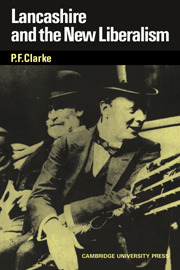Book contents
- Frontmatter
- Contents
- Preface
- Abbreviations
- Dedication
- PART ONE INTRODUCTION
- PART TWO FORMATIVE INFLUENCES
- PART THREE THE TERMS OF THE CONTEST
- PART FOUR THE RECONSTITUTION OF LIBERAL LANCASHIRE
- 7 C. P. Scott and Progressivism
- 8 The sinews of war
- 9 Men of light and leading
- PART FIVE FIELDS OF RECRUITMENT
- PART SIX GOING TO THE COUNTRY
- PART SEVEN CONCLUSION
- APPENDICES
- Bibliography
- Index
7 - C. P. Scott and Progressivism
Published online by Cambridge University Press: 23 November 2009
- Frontmatter
- Contents
- Preface
- Abbreviations
- Dedication
- PART ONE INTRODUCTION
- PART TWO FORMATIVE INFLUENCES
- PART THREE THE TERMS OF THE CONTEST
- PART FOUR THE RECONSTITUTION OF LIBERAL LANCASHIRE
- 7 C. P. Scott and Progressivism
- 8 The sinews of war
- 9 Men of light and leading
- PART FIVE FIELDS OF RECRUITMENT
- PART SIX GOING TO THE COUNTRY
- PART SEVEN CONCLUSION
- APPENDICES
- Bibliography
- Index
Summary
When in 1897 Scott invited this writer to join his staff the reason he gave was his belief that the relations of Liberalism and Labour must govern the future of politics, and that the problem was to find the lines on which Liberals could be brought to see that the old tradition must be expanded to yield a fuller measure of social justice, a more real equality, an industrial as well as a political liberty.
L. T. HobhouseWhen C. P. Scott retired in 1929 after fifty-seven years as Editor of the Manchester Guardian he was universally acclaimed as one of the world's great journalists. It was only after 1914, however, that he had taken to writing a large share of leading articles himself, and during half of the twenty years before the War the daily production of the paper in Manchester was carried on by others while he attended to his Parliamentary duties at Westminster. It would be a mistake, therefore, to imagine that Scott's own pen was exclusively responsible for his importance or for that of the Manchester Guardian in this period. Important he certainly was, though; Ensor, who had served under him from 1902 to 1904, described him as, in 1914, ‘probably the most influential liberal in the country outside the cabinet’. Much of this chapter will be concerned with Scott as a politician in his own right and with his role, through the paper he controlled, as the propagandist of a strain of progressive politics which was at the core of the Liberal revival in the north west.
- Type
- Chapter
- Information
- Lancashire and the New Liberalism , pp. 153 - 197Publisher: Cambridge University PressPrint publication year: 1971



